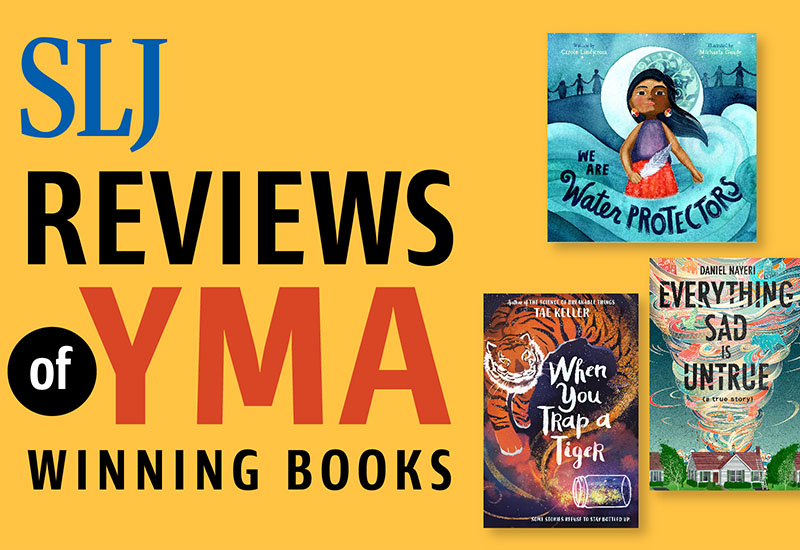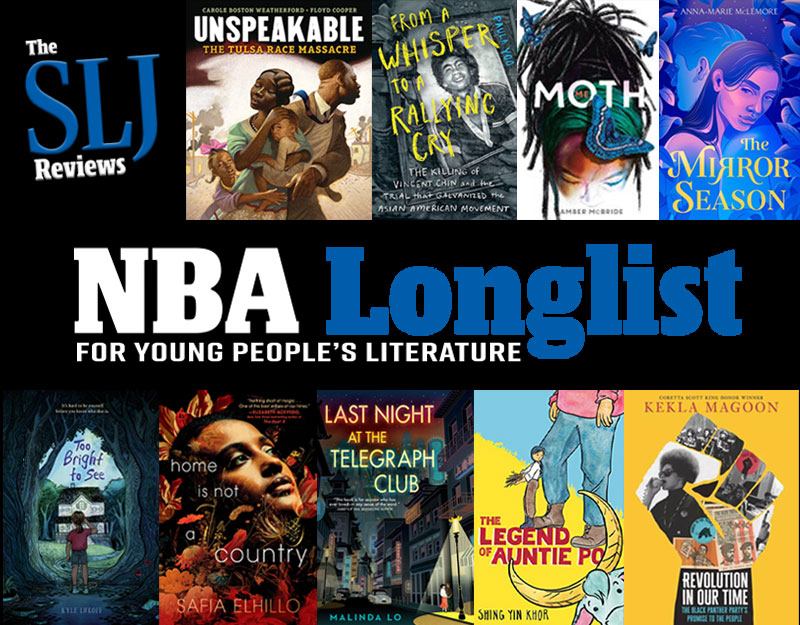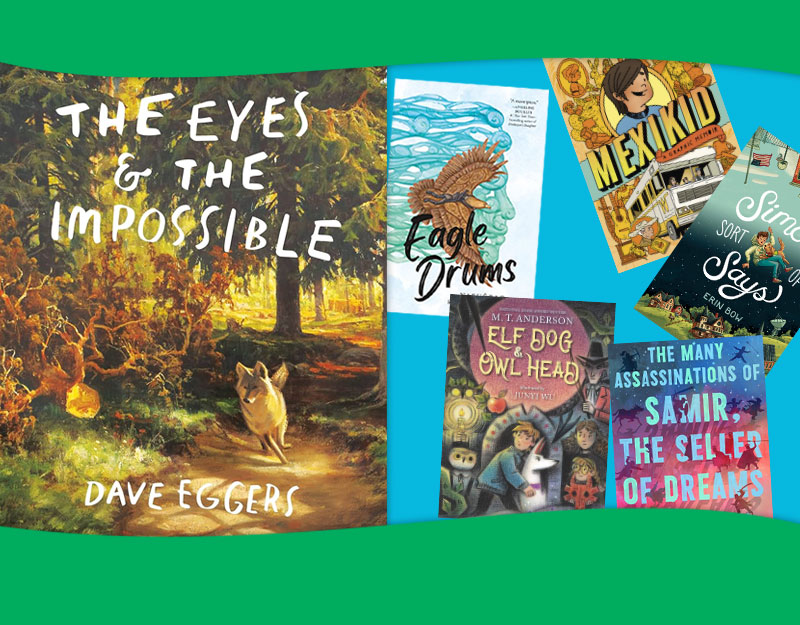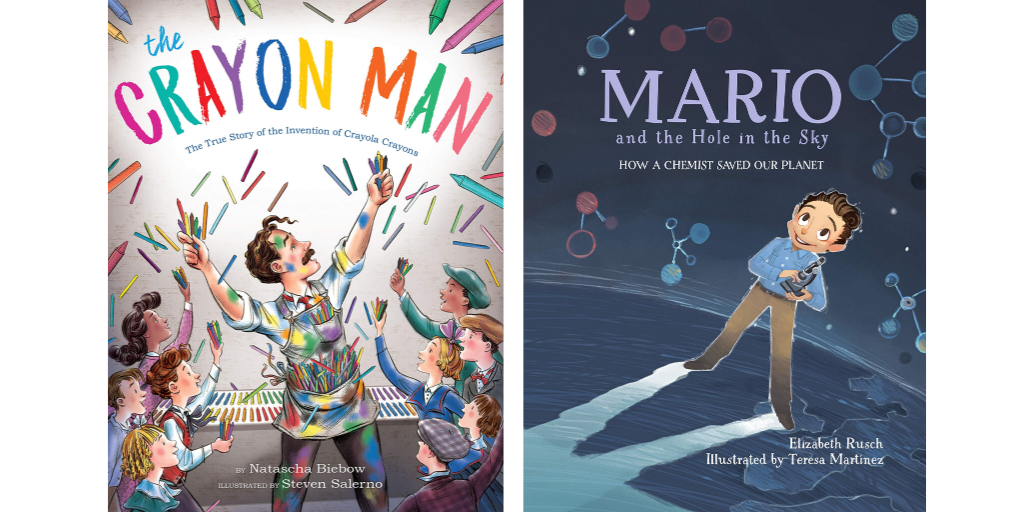Heavy Medal Mock Newbery Finalist #2: Genesis Begins Again
Introduced by Heavy Medal Committee Member Mary Zdrojewski

As soon as Genesis Begins Again arrived in my library, I noticed it was never on the shelf. The book was checked out by a 7th grade student, and from there it was passed from hand to hand. Students came to return it with the person who was checking it out next. Some books arrive with a clamor and have a waiting list a mile long, but some sneak in with a whisper from ear to ear.
Genesis Begins Again is that whisper that spread through my school.
The book begins with a scene that will make anyone who has experienced middle school cringe: Genesis might finally have a chance with the girls who run the school, but, just as her hopes raise, she arrives home to find the furniture on the lawn because they’ve been evicted again, and all her hopes are beaten down in an instant.
ADVERTISEMENT
ADVERTISEMENT
From that first scene, readers connect with Genesis as her family is forced to relocate, first living with her unfriendly grandmother and then moving to a dream house in a different school area. Through the story, Genesis struggles with the list of reasons to hate her, a list started by others but added to by Genesis herself. One thing from the list she is determined to change is her dark skin tone, and her methods intensify from painful to dangerous. With the support of a choir teacher and friends at her new school, Genesis struggles to find her voice and appreciate who she is. Those struggles and how she responds to them develop Genesis as a complex and believable character.
Plot development is another strength. This book is filled with tension. Genesis and her mother never know when her father will be drunk and when he will gamble away their money; every day she is left wondering if this is a day they will fry shrimp together for a midnight snack or a day he’ll say how much he hates her skin. Her conversations with her mother and grandmother also keep the reader on edge. Though Genesis is living in a nice house and going to a school she likes, she can’t allow herself to settle in, because there’s no way of knowing when they’ll be kicked out of this house, too.
In addition to family and school struggles, Genesis Begins Again wrestles with challenging themes, offering a vibrant look into issues of colorism that are rarely seen portrayed so clearly in middle grade fiction.
We now welcome more comments about Genesis Begins Again, from members of the Heavy Medal Committee and from any other readers. We’ll start with positive comments about the book and open discussion up to questions and concerns once five positive comments have been posted.
Filed under: Book Discussion
About Steven Engelfried
Steven Engelfried was the Library Services Manager at the Wilsonville Public Library in Oregon until he retired in 2022 after 35 years as a full-time librarian. He served on the 2010 Newbery committee, chaired the 2013 Newbery Committee, and also served on the 2002 Caldecott committee. You can reach him at sengelfried@yahoo.com.
ADVERTISEMENT
ADVERTISEMENT
SLJ Blog Network
2024 Books from Pura Belpré Winners
In Memorium: The Great Étienne Delessert Passes Away
Winnie-The-Pooh | Review
Parsing Religion in Public Schools
Finding My Own Team Canteen, a cover reveal and guest post by Amalie Jahn
ADVERTISEMENT








When I first heard about this novel, I was concerned that the book would create a character designed with many social stereotypes that are not always consistent with reality.
But, as I read the book—and then re-read it—- I realized the author paints a very accurate picture of what many students like Genesis go through in middle school. Read again the first three chapters and ask yourself ” do I feel like I know Genesis as I do one of my close friends? ” For me, the answer was a resounding YES.
Mary does a great job of discussing particular aspects of the plot development.I agree that the author presents a seamless plot development woven within a multi-layered, exemplary example of character development.
This novel deals with many relevant themes in a way that , when viewed in the context of the Newbery criteria, is definitely a” distinguished contribution to children’s literature”.
The raw realism that is conveyed though Genesis as a character and through the plot as Mary notes is what makes this book powerful. Anyone who has been through or is going through middle school will really connect with not only her interpersonal struggles but also her personal body image struggles. All this conflict is drawn so vividly and is portrayed honestly through Genesis. Another element that really stands out is the emotional arc. Genesis’s change is real and develops in an appropriate manner. So many authors struggle to make such a broad emotional change in their characters and either do it too quickly or without any real impetus. This book however really makes the progress genuine and in such a way that we know how and why Genesis is changing. I also appreciate that the book ends on a note of hope but not without everything really wrapped up in a neat bow leaving some of the uncertainty of real life as part of the realism it conveys. Overall this book really engages readers in a powerfully raw experience that conveys the best of what realistic fiction can bring.
This is a book that is almost impossible to put down once started. What I think Alicia D. Williams does astonishingly well is write Genesis with such raw emotion and passion. You can feel the heartbreaking reality that Genesis faced through the novel, not only with the struggles of her home life, but her internal and external struggles with colorism. Williams creates in Genesis a character that is so real that readers will be talking to her throughout with words of encouragement and will be rooting for her every step of the way. The authenticity of the writing and the character development of Genesis is as refreshing as it is raw. I think Williams has demonstrated with this novel that she is an author of distinguished writing and highly deserving of recognition by the Newbery Committee.
I agree with others that Genesis’ character development is a true strength of this novel. There’s depth and complexity that comes through in ways that will really resonate with readers. The conversation she has with Dad (p 294-297) just has so much in it. Her insecurity about her looks, her fear of confronting her father, the recognition of his lies. Then she ends, not with a big speech or anything, but by inviting him to her talent show, because she still craves his approval even though she’s now perceptive enough to see his flaws. “The softness in his voice makes me wait, hoping, stupidly hoping, that he says he’ll probably come.” (297)
I agree with the positive points that everyone else has pointed out here. I also think the descriptive language Williams uses is excellent. The way you can feel Genesis’s burning scalp and scratched skin through her visceral description is truly well done.
I agree! I had almost forgotten how my skin burned reading those passages.
Some excellent examples of the strengths in Genesis Begins Again have been raised. Feel free, at this point, to expand the discussion to include all ranges of opinions…
This book is powerful, important and so difficult to read. I felt such pain and heartbreak for Genesis throughout the book. I know that this life of insecurity, dread and shame is real for many kids. That’s why I believe that this is such an important book. Kids who face eviction, frequent transitions from school to school and home to home, adults who intentionally and unintentionally degrade their self esteem need to see that they can rise above their circumstances. They can thrive and shine the way Genesis does in the end.
I agree that the characters of this book are truly distinguished. Williams creates a complex network of people around Genesis. Particularly well drawn are Genesis’ father and grandmother. I grind my teeth when I think of them both even now, months after reading the book. Her father’s constant lies and letdowns (that she had to go to his workplace to find out that he had been fired again!) and the grandmother’s constant obsession with skin color (the paper sack test!). These characters live in my heart and mind. I loathe them both! So that means Williams did a masterful job of creating memorable characters. The most memorable character of all, though, is Genesis herself. She demonstrates resilience. She finds her voice—literally. She learns to accept herself as she is—beautiful. She discovers role models beyond the immediate family that constantly disappoints her. She shows our young readers that they can begin again and make their own way, in spite of the difficult hands they are dealt. I am glad this book is in the world and on our list for Newbery consideration.
Absolutely agreed, Molly. I wanted to draw attention to the characterization of the secondary characters – her father, mother, and grandmother especially, and you’ve beaten me to it. What I found particularly well done was how Williams drew in details about their upbringings and circumstances – not to explain away their behaviors or actions – but to help the reader see how truly pervasive racism and colorism can be. Seeing all these characters through Genesis’s eyes helps the reader forge their own path, like she does, to rise above the beliefs of others that might hold them down.
This is not an easy read, and at times heartbreaking. Readers are taken on a realistic journey that is unforgettable.
I, too, found the book powerful and effective. This question is not a challenge but to invite HMAC members to chime in on the development and portrayal of another set of characters: her school mates and others of her age from her neighborhood. Do you find those well-rounded, detailed, and drawn with a balanced hand? Or do you find some or all of them “types” and somehow two-dimensional? How does that enhances or hinders the excellence of this book?
So…..if the final analysis of this novel was based solely on the development of the main character, this book would be at or near the top of my list…..
But, it is important to make the other vital characters fully developed in such a way that the reader can see their depth and layers of feeling/thinking.
I do not believe the author successfully pulled this off. I felt the mom and grandmother were important to the narrative but not characters who I understood as deeply as I would have liked.
This novel is still “distinguished”, but this flaw keeps it from being the “most distinguished” when being compared to about 5 other titles we will be discussing soon.
I’m in full agreement with Roxanne and Samuel. I think that this novel is weakened by the lack of characterization in the minor characters. I especially felt the “mean girls” both in the beginning and Genesis’s new school were very stereotypical of that archetype. I think while the “villain” is often underdeveloped I feel that to be “distinguished” we really need to see all sides of the antagonist and in this book, we fail to see that. In fact, at times they often felt like they were exact replicas of other “mean girls” I’ve read about or seen in movies. That is not to say that these characters did not expand the characterization and development of Genesis as the main character, but they certainly were underdeveloped or developed in a very common way that did not distinguish them from all the other characters I’ve read and seen of this type.
I am in agreement as well. Honestly, when I think about Genesis Begins Again, I have a strong sense for who Genesis was and her mother, her father, and her grandmother. However, I cannot remember anything about the “means girls” except that they were mean. I feel like other books on our list this year (namely “New Kid”) do a better job of fleshing out our antagonists in a way which I think makes them more distinguished.
Agree with this thread.
Sometimes I struggle with plot elements that I feel like I’ve seen too often…I realize that in most cases the child audience will not have seen those elements, maybe even once. But having said that: competing in talent show as a way to shine seems like kind of a standard, not distinguished situation to build a climax upon. It makes me wonder how Genesis would have developed and shown her growing strength and sense of worth if she happened to not be a talented singer with a special event lined up. This feels like nitpicking even as I write it, but I do wonder if anyone else felt this too?
Falling back on a trope that has been overused, such as a talent show resolution, goes beyond a nitpick to an actual (if not enormous) concern. It may not be a deal-breaker, so to speak, but I, too, find these sorts of plot devices take me out of a story. And you’re absolutely right that the fact that she *had* this talent to begin with gave the author an easy way out.
There are so many things to think about throughout this thread. I strongly agree with everyone that Genesis’s story is heartbreaking. Genesis is dealing with so much more than her challenges at school, which is unfortunately true for many middle school students. Readers will surely identify with Genesis as she struggles with body image, bullying, friendships, and fitting in. What separates this title from the pack is that she also feels “less than” outside of school due to homelessness, poverty, alcoholism, colorism, and abuse, and the author skillfully portrays the ugliness and consequences of each.
We better understand Genesis’s self-loathing as we get to know her father and grandmother – the people who should lift her up. Instead, they repeat behaviors learned from their own childhoods and serve to underscore the 96 reasons why Genesis dislikes herself. Her mother does try to shield Genesis from her father’s shameful, drunken outbursts, but as a victim herself she is unsuccessful – she cannot “unring” the bell!
What Williams does so successfully is depict the conflicting emotions that both Genesis and her mother experience as they deal with her father and grandmother. The range and variety of feelings and behaviors they suffer through are authentically fleshed out. Because of this, readers gain great insight into why victims struggle to remove themselves from these destructive situations.
I agree that the schoolmates’ characters are not fully developed, but I don’t feel the reader needs more. Williams provides backstories for Genesis’s mother, father and grandfather, and that along with the budding friendships and supportive teacher are enough to understand Genesis’s struggle and eventual growth. The true villains in this story are the social issues that Genesis must overcome to see value in herself.
Lastly, I agree with those who are troubled by Genesis finding her voice in the talent show. I’m not sure if it will be a “fatal” flaw, but it did feel tired and overused. That said, Genesis’s story is raw and relatable, and it’s a survival story that may outshine the talent show.
What I was surprised and pleased about this book was definitely the raw portrayal of a subject that’s hardly talked about in other middle grade novels. At the same time, I felt this was watered down from what it could have been and other obstacles were created that just distracted from the issue. I’m sure people who reads this book will meet a character that’ll be hard to forget.
We’re now closing comments on our HM discussions, as balloting by the HM Committee is underway. Look for new discussions in the January 23rd post as members re-discuss contending titles.